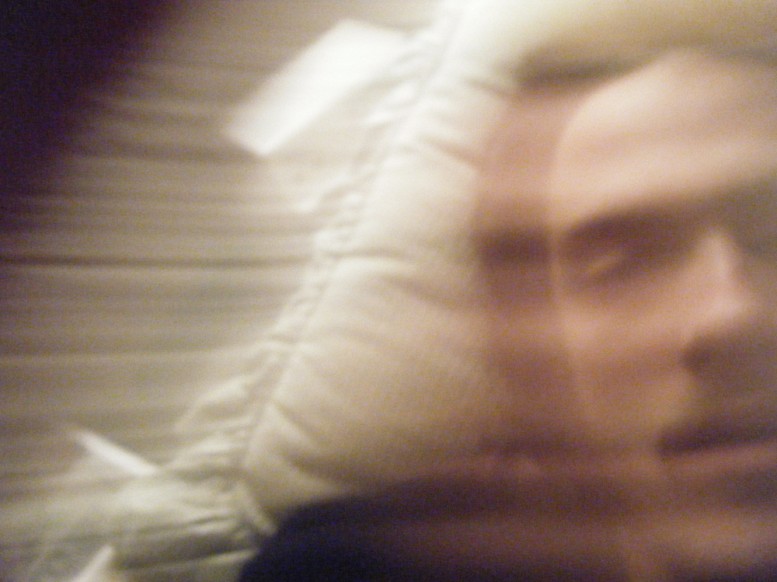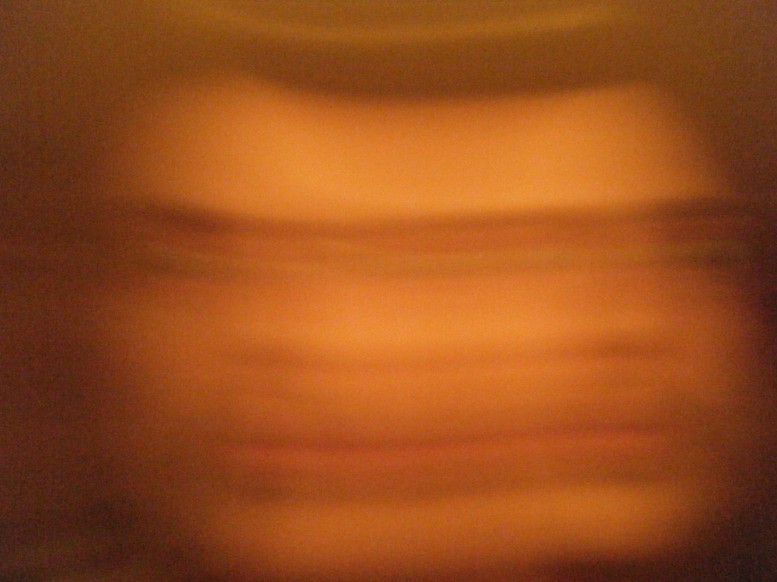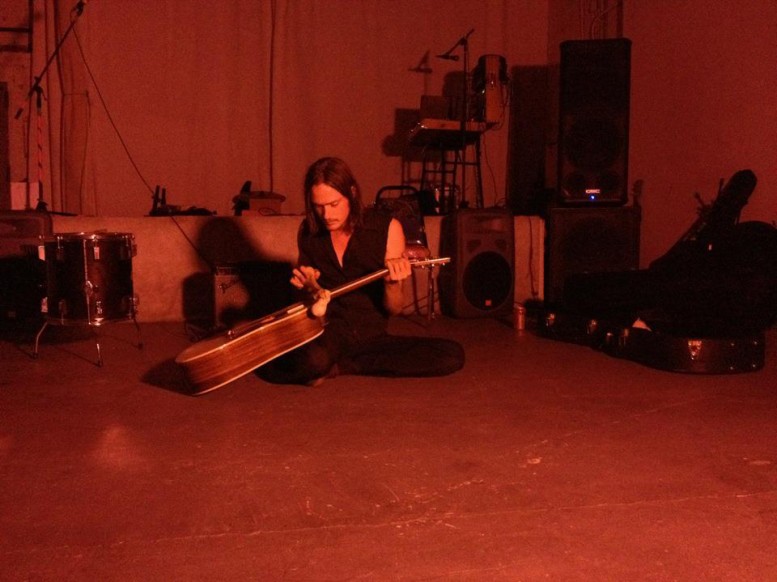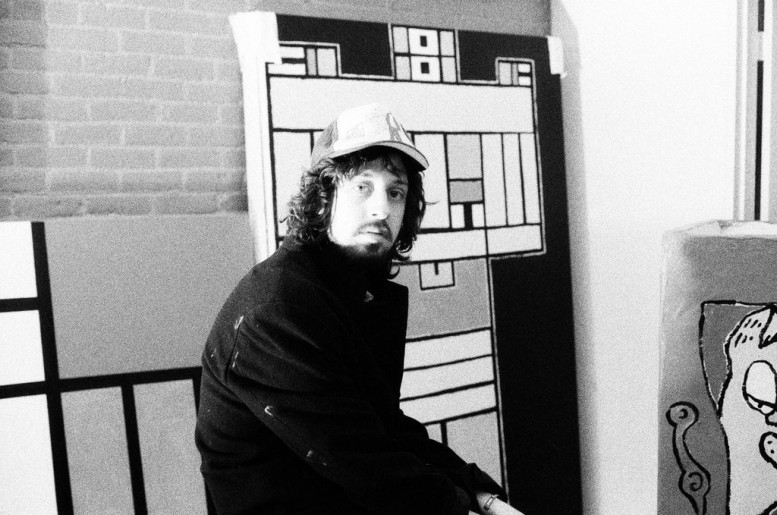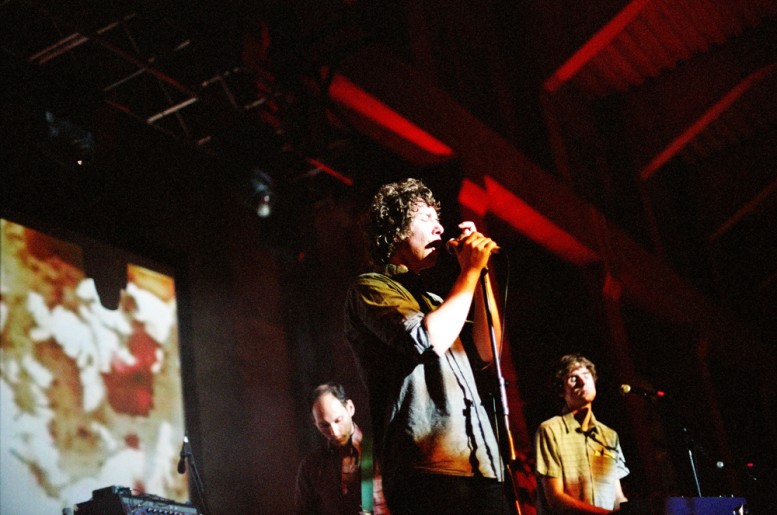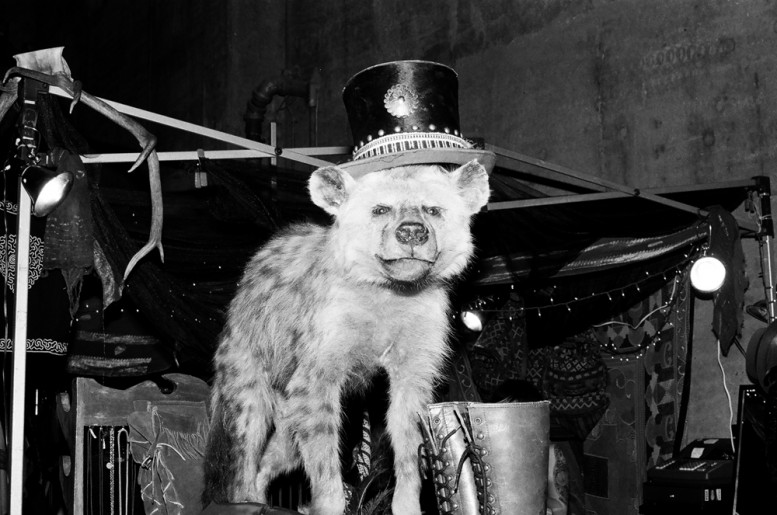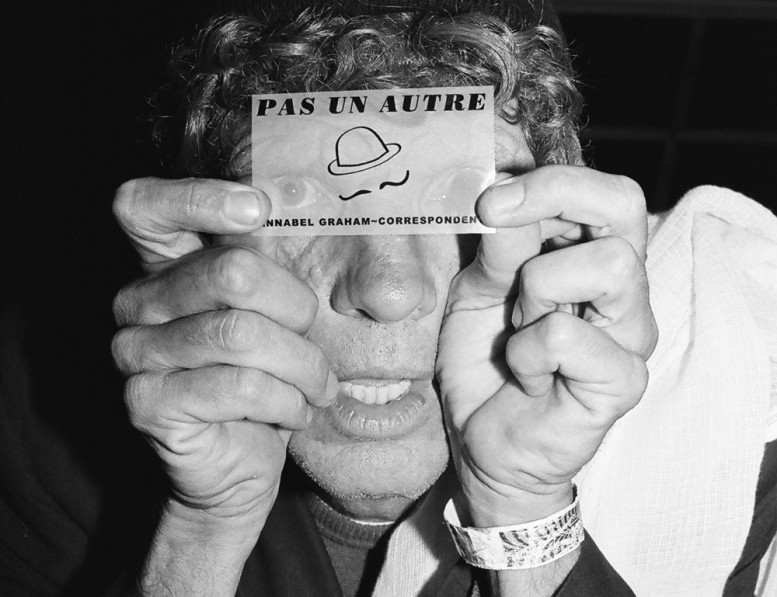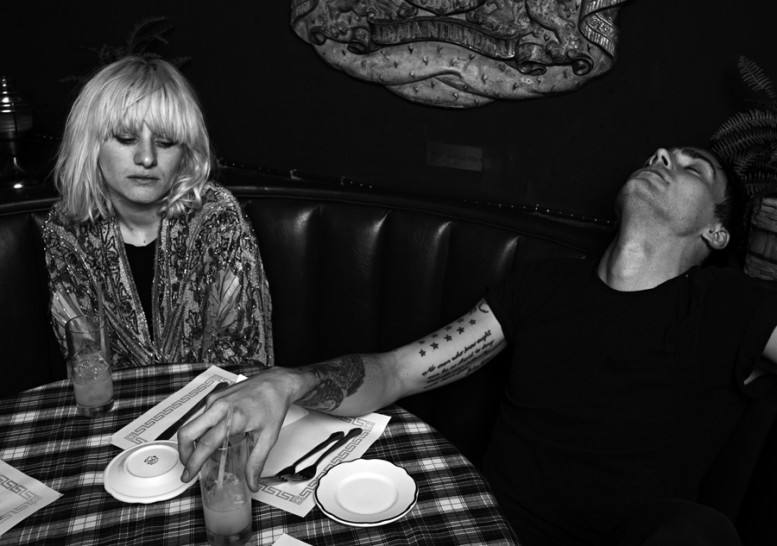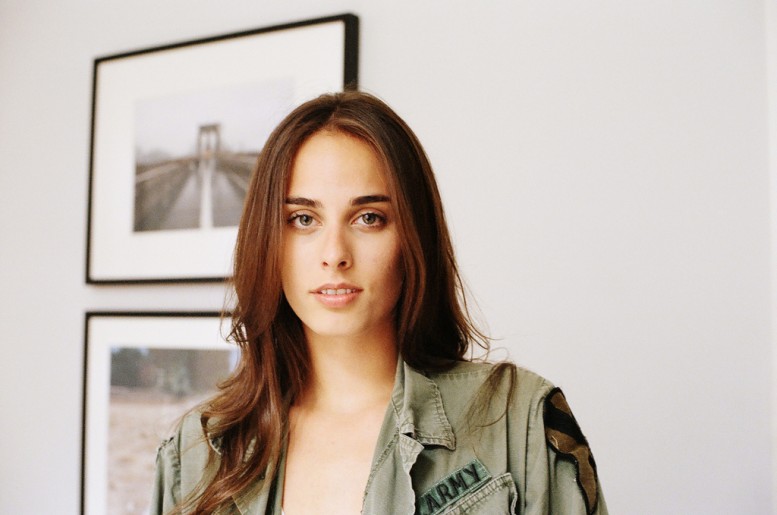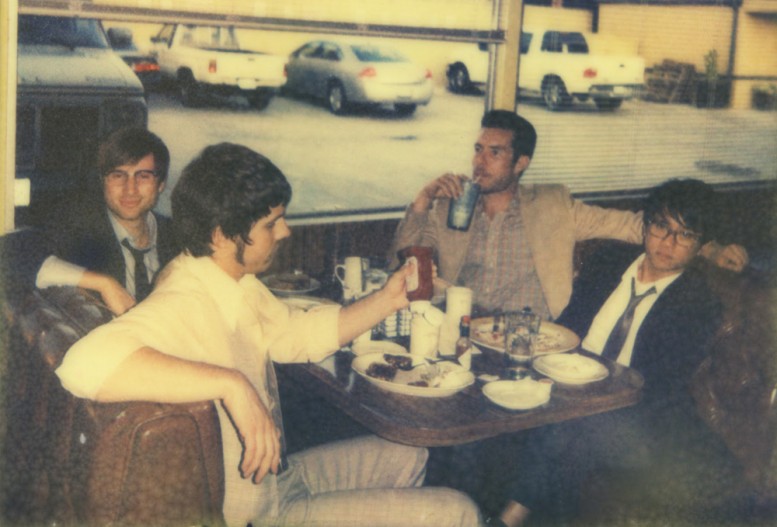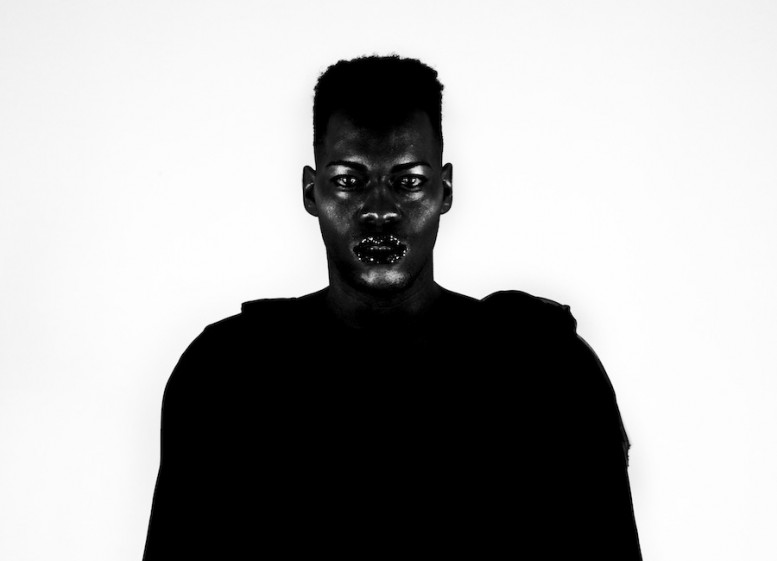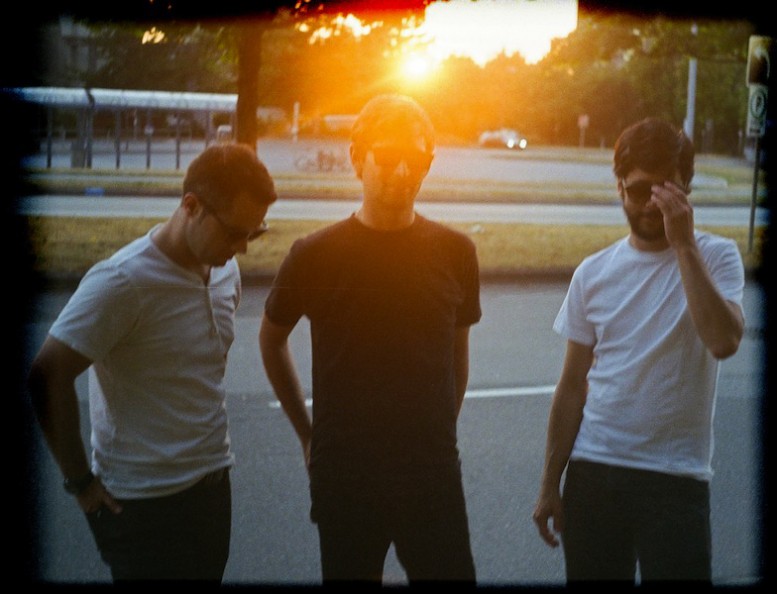Visit artist and musician Bradley Bailey’s bandcamp page for his one-man band, oxymoronically called Platonic Sex, and you’ll find a single song tiled Sweet Nothing available for download for $1000. Watch a youtube video made last summer in Brooklyn and you’ll find Bailey playing a fifteen minute long, psychedelic and cacophonous set with a human femur. The Atlanta, Georgia based musician doesn’t have much of an online presence, but what he does have so far is a curious teaser for what might be to come, or not to come. Bailey seems content just figuring out who he is an artist and making music. Autre contributor Abbey Meaker got a chance to catch up with Bailey where he is currently in Atlanta thinking things over.
ABBEY MEAKER: How are you doing right now and where are you? Describe the environment in which you are sitting.
BRADLEY BAILEY: Things are this way and that, I am doing fine, I am sitting in a facet of the broken home of Atlanta, Ga. for a visit, figuring out where to go and what to do with myself next
MEAKER: How old were you when you were compelled to write your first song and what were the circumstances?
BAILEY: I wanted to be a songwriter for as long as I can remember, when I was a little child I loved pretty much all music, practically absent of discernment as children can often be... I would often come up with songs in my head and always write and improvise a little bit on my grandparents piano while visiting, until getting SHUSHED! It was when I was ten I began writing songs and really learning the guitar, bass and keys.
MEAKER: How would you describe the music that you're making now? Has it changed over the years?
BAILEY: The music I'm making now is and has always been eclectic, though it has undergone many twists and turns, many things have remained the same since always, some sounds and emotions continue to show through many very contrasting styles... The difference is that now I feel I have reached and transcended many of the the goals I've had in the past... Where some things were desired they are now manifested and enjoyed... For example the inspiration to really express the vast music that exists within a single sound used to be a fleeting and very personal accomplishment at best, mostly a dream, however now I have developed methods of expressing that in ways I only hoped and dreamed I could... Namely what I've been doing with strings and objects...
MEAKER: Is there a particular recent performance that stands out as being more interesting than others? If so, why?
BAILEY: Lately what stands out as being more interesting than others would be the bone song... I've been bowing strings with a human femur. I started with some kind of animal bone but the size, shape and weight were not ideal. The human femur is the perfect bone for it functionally and also provides for a profound example of the fact that music is vibration and with its creation carries with it destruction, its a very natural phenomena, it courses through us at all times and extends beyond our very perception and sensory experience of it.... In performance I have generally been using an acoustic guitar because I like to keep the method organic, keep the effect of it unaffected by even amplification and at the same time non verbally express that no effects are being used, no tricks, which people still think there are unseen amplifiers and effects... Though many wild sounds can be made with this technique I keep it simple and repetitive live, very zen, as I often do alone, expressing how the dynamics of the method can change so vastly in doing so, that one thing can sound so many different ways, actually unearthing the many sounds within a sound that this method can provide... I gently rub the bone on the strings in one place a certain way that makes it vibrate, then I focus on maintaining and expanding that vibration... In doing so, just one string can move through a great spectrum of notes tones and sounds and harmonize with itself... with the 6 strings of a guitar I can even get limitless orchestrics, choirs of shifting harmony that really sound like voices to the naked ear... and because the technique is so delicate, the very subtlest change in motion changes it, thus it becomes like a narrative of my very experience, my very physical emotion, its like improvising from the soul but having a whole ensemble of selves following every nuance of conduction... its very execution is very personally expansive and rewarding. I've been experimenting with friction in music since my teenage days and i now feel it has more than paid off creatively and existentially... I simply discovered it while doing what I do at a friends house that had some animal bones... I have discovered many special ways of making music using objects on strings, the bone just works so well. Also shells work very well in their way, they have an amazing percussive element with their textures and resonate like bone because I suppose the material is practically the same, but the size, shape and weight are not as dynamic... Clay and such materials wail, theyre really hot and easily screech, but they wail... I imagine there are some stones and crystals that will work as well as bone, probably selenite... that will be my next venture with it.
MEAKER: Do you have any philosophies - spiritual or otherwise - that influence your music or any other medium you might use to express yourself?
BAILEY: There are so many inspirations that influence all of my mediums of expression, philosophical, existential, even spiritual... Most simply and basically the notion that whatever medium it is bears wonderment beyond what one could ever perceive, as do our very selves and I like to treat them as such, purely as such, solely undergoing the wonderment of what they are, enjoying them, not taking them for granted, always a gift, of expression, joy, healing, catharsis, insight, interest, mystery, twerk, etc... and total wonderment.... And the notion that we can really have a very great time together as people, ya know... It boils down to expressing inspirations of how manifesting a very great time in this crazy world and actually undergoing the experience of its wonderment even beyond only a contenting extent is entirely plausible... Within that, much philosophy, spiritual and otherwise is to be expressed...
MEAKER: When we spoke, you said that "Sweet Nothings" is a sketch - do you know what you plan to do with the song?
BAILEY: "Sweet Nothings" was a sketch when I recorded it, I hadn't even played it all the way through before I recorded it but I like the sound of it so I kept it. Fresh, raw, new material, when undergone willingly and passionately always has substance that can't be found further in its evolution and I, as many others do, like to capture that and often prefer it, though there is much to be had with polished work as well that can only be achieved through its evolution.... "sweet Nothings" was released on the album "Advances" by "Platonic Sex", an ongoing and thus far very loose and open ended project of mine... "Advances" was a very loose and open ended, somehwhat experimental project of an album that I felt was good for such a raw performance as "Sweet Nothings". It was released on Atlanta's "Big Blonde Records" alongside a diverse mix of awesome Atlanta musicians. I'm touching the album up a little bit and putting it up online soon and printing CDs... As far as what's to come with the song, it will undergo various arrangements that I have conceived in my mind and also have yet to imagine... The first verse, which is in the format of simple love poetry, changes often where the last verse always stays the same "We're always whispering sweet nothings... and little phrases we repeat ... how could they be sweet if they are nothing? How could be nothing if they're sweet?"
MEAKER: Any upcoming projects or plans for an album?
BAILEY: I have so much material and so many albums and projects planned out in my mind, circumstances have been so very difficult, I've hardly done any of it, that's a whole collection of long stories.... I hope you can expect a broad spectrum of things....
MEAKER: Where can we hear more of your music or see you perform?
BAILEY: I hardly have anything up online right now, mostly its just random things people have captured and posted on youtube, check out "Bradley Bailey-Bone Song" on you tube or "Platonic Sex" on bandcamp for now and hopefully in the next year I will have more material available... In the meantime I play live in many facets regularly and randomly around the US.
Intro text by Oliver Maxwell Kupper and interview by Abbey Meaker. First three photographs by Bradley Bailey. Photo below by Ryan Callahan

